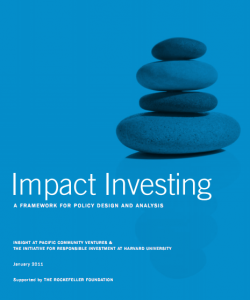 The growth of social capital markets, in size and influence, invariably raises the question: what role for government?
The growth of social capital markets, in size and influence, invariably raises the question: what role for government?
If private enterprise can deliver measurable social and environmental benefits, government may have an interest in providing support through favorable regulation, tax breaks, co-investment, capacity building, R&D, and other policies.
Impact Investing: A Framework for Policy and Design – published in January by InSight at Pacific Community Ventures and the Initiative for Responsible Investment at Harvard University, supported by The Rockefeller Foundation – highlights some rules of thumb for using policy to catalyze private capital for public good.
I was deeply involved in the research behind this document and I will visit some specific report findings in future articles, which were distilled from hundreds of policies that we looked at globally, of which 16 are profiled in the report, from 13 countries.
As an introduction, it is important to recognize that: first, very few governments have considered how private capital might be leveraged to accomplish social objectives – as a result, policy typically influences social capital markets only as an unintentional or ancillary outcome; and second, where policy does explicitly target investors or recipients of social capital, the role of government becomes a decisive factor in the creation and development of impact investing markets.
Policy tends to be directed explicitly to social capital markets only in more developed countries. In these places, policy effectively institutionalizes a particular model of social change – for example a special purpose vehicle for community finance, a corporate structure for attracting investment to dual-purpose businesses, a procurement policy favoring under-served entrepreneurs, or a framework for directing public capital to clean technologies.
Of course institutionalization has an important place and is critical to building scale. Yet, the idea of institutionalization is far from the reality faced by the entrepreneurs working on the ground in developing countries who we hear a lot about at SOCAP.
Put another way, policy is the key variable that distinguishes two very different conceptions of social capital markets. On the one hand, social capital markets in countries with very little related policy infrastructure are more entrepreneurial, innovation is uncoordinated, and the hard work happens at the grassroots level. Moreover, these countries attract entrepreneurial activity in part because government infrastructure is in fact limited. The need for social entrepreneurship is perceived to be greater, and there are fewer barriers to entry. This is the more common way in which social capital markets and impact investing is currently framed.
Social capital markets in countries where the role of government is more ubiquitous – and with the robust institutions and more mature financial infrastructure to accommodate impact investing policy – are no less innovative. It just so happens that this innovation is more institutional in nature – characterized by larger investors leveraging opportunities imbedded in regulation and the tax code.
Because policy is the key differentiating variable, a conversation about the role of government can benefit practitioners in both worlds – helping to build scale in developing markets, and helping to bring a fresh entrepreneurial perspective to efforts to create jobs and address other important social priorities closer to home.
And because the conversation is just getting started, we all have an opportunity to set the agenda, including social entrepreneurs in developing countries. The key question here is the extent to which an overarching government framework might be useful for extending our impact and, if so, how to build momentum for policy innovation. A good starting place is the concrete policy ideas that surfaced recently in the UK and Canada.
A final thought: I fully expect that our scan of impact investing policies globally overlooked a significant number of exciting developments. We welcome news of all policy innovations and hope that you share them, no matter where they originate and at what level of government.

